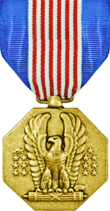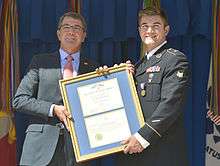Soldier's Medal
| Soldier's Medal | |
|---|---|
 | |
| Awarded by United States Army | |
| Type | Medal (Decoration) |
| Awarded for | Distinguishing oneself by heroism not involving actual conflict with an enemy |
| Status | Currently awarded |
| Statistics | |
| First awarded | October 17, 1927 |
| Precedence | |
| Next (higher) | Distinguished Flying Cross |
| Equivalent |
Navy & Marine Corps - Navy and Marine Corps Medal Air Force - Airman's Medal Coast Guard - Coast Guard Medal |
| Next (lower) | Bronze Star Medal |
|
Service ribbon | |
The Soldier's Medal is an individual decoration of the United States Army. It was introduced as Section 11 of the Air Corps Act, passed by the Congress of the United States on July 2, 1926.[1][2] The criteria for the medal are: "The Soldier's Medal is awarded to any person of the Armed Forces of the United States or of a friendly foreign nation who, while serving in any capacity with the Army of the United States distinguished himself or herself by heroism not involving actual conflict with an enemy."[3]
History
A need to recognize acts of heroism in 1922 resulted in the War Department's issuing orders for acts of bravery during peacetime. This led to an Act of Congress (Public Law 446-69th Congress, July 2, 1926 (44 Stat. 780)) which established the Soldier’s Medal for acts of heroism not involving actual conflict with an enemy. The Secretary of War directed that the Quartermaster General prepare and submit appropriate designs of the Soldier’s Medal per letter signed by The Adjutant General dated 11 August 1926.[2]
The first Soldier's Medals were awarded on October 17, 1927 to John F. Burns and James P. Martin[4] for their heroism during a fire and to James K. Wilson[5] and Cleophas C. Burnett[6] for saving people from drowning.[7]
The period of time when the most Soldier's Medals were awarded was World War II (at least hundreds were awarded).
The Soldier's Medal is considered to be equivalent to the Navy and Marine Corps Medal, Coast Guard Medal, and Airman's Medal (between 1947 and 1959, the U.S. Air Force awarded airmen the Soldier’s Medal since the separate Airman’s Medal was not established until 1960).
Criteria
The distinguishing criterion for awarding the Soldier's Medal, per Army Regulation 600-8-22, para 3-13, is "The performance must have involved personal hazard or danger and the voluntary risk of life under conditions not involving conflict with an armed enemy. Awards will not be made solely on the basis of having saved a life."[3] It is the highest honor a soldier can receive for an act of valor in a non-combat situation, held to be equal to or greater than the level which would have justified an award of the Distinguished Flying Cross had the act occurred in combat. Any enlisted American servicemember who is eligible for retirement pay will receive an increase of 10 percent in retirement pay, if the level of valor was equal to that which would earn the Distinguished Service Cross. Additional awards of the medal are denoted by oak leaf clusters worn on the suspension and service ribbon of the medal.[2][3]
Appearance
The bronze medal is issued as a 1 3/8 inch wide Bronze octagon with an eagle displayed, standing on a fasces, between two groups of stars of six and seven, above the group of six a spray of leaves. On the reverse is a shield paly of 13 pieces, on the chief the letters “US”, supported by sprays of laurel and oak, around the upper edge the inscription “SOLDIER’S MEDAL” and across the face the words “FOR VALOR.” In the base is a panel for the name of the recipient to be engraved. The medal is suspended from the ribbon by a rectangular-shaped metal loop with corners rounded.
The ribbon is 1 3/8 inches wide and consists of the following stripes: 3/8 inch Ultramarine Blue 67118 on each side and the center containing 13 White and Red stripes of equal width (7 White 67101 and 6 Old Glory Red 67156).[2]
Notable recipients

- Edith Ellen Greenwood of the United States Army Nurse Corps (ANC) during World War II was the first female recipient of the Soldier's Medal.
- Colin Powell, who, during his second tour of duty in the Vietnam War, was injured in a helicopter crash and, despite his wounds, rescued two comrades from the burning wreckage.
- Marty Allen, USAAF, was awarded the Soldier's Medal for bravery during a plane fire.
- Otto Kerner, Jr., US Army, was awarded the Soldier's Medal for rescuing a drowning soldier off the coast of Sicily.
- Henry Mucci, US Army, was awarded the Soldier's Medal for rescuing a soldier in danger of drowning in 1943.[8]
- Hugh Thompson, Jr., Lawrence Colburn, and Glenn Andreotta were awarded the Soldier's Medal for their intervention in the My Lai Massacre (1968), which included threatening to fire on their own comrades if they didn't stop the killings.
- In 2001, the U.S. Army awarded 28 Soldier's Medals to personnel who risked their own lives to assist their comrades in the wake of the September 11 attack on the Pentagon.
- Alek Skarlatos was awarded the Soldier's Medal after thwarting a terrorist attack on a train in France.[9]
- Tom Surdyke, a first year West Point cadet, received the Soldier's Medal posthumously after dying while saving a civilian from drowning while on vacation.[10]
- John Gaffaney, received the award posthumously after dying while trying to charge the shooter during the 2009 Fort Hood shooting
See also
- Awards and decorations of the United States military
- Awards and decorations of the United States Army
- List of military decorations
- List of Soldier's Medal recipients
References
- ↑ Mooney, Charles C. and Layman, Martha E. (1944). "Organization of Military Aeronautics, 1907-1935 (Congressional and War Department Action)" (PDF). Air Force Historical Study No. 25. AFHRA (USAF). Retrieved 14 Dec 2010., Appendix 5, p. 126.
- 1 2 3 4 "Soldiers's Medal". The Institute of Heraldry: Office of the Administrative Assistant to the Secretary of the ARMY. Retrieved 2013-12-21.
- 1 2 3 "Personnel-General Military Awards" (PDF). Department of the Army. 2013-06-24. Retrieved 2014-02-09.
- ↑ "James P. Martin". Military Times. Retrieved October 8, 2015.
- ↑ "James K. Wilson". Military Times. Retrieved October 8, 2015.
- ↑ "Cleophas C. Burnett". Military Times. Retrieved 8 October 2015.
- ↑ ""For Heroism...." The Soldier's Medal". United States Army. February 2, 2010. Retrieved October 8, 2015.
- ↑ "Henry Andrews Mucci". Military Times. Retrieved October 8, 2015.
- ↑ Cooper, Helene (September 17, 2015). "A Hero's Welcome at the White House". The New York Times. Retrieved October 8, 2015.
- ↑ Jahner, Kyle. "West Point cadet earns Soldier's Medal for his dying act". ArmyTimes. Retrieved 7 July 2016.
External links
| Wikimedia Commons has media related to Soldier's Medal. |